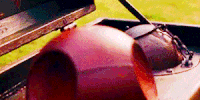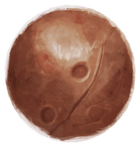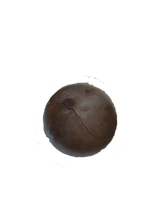
|
Warning!
At least some content in this article is derived from information featured in: Harry Potter: Puzzles & Spells & Harry Potter: Wizards Unite & Harry Potter: Hogwarts Mystery. |
- "The Bludgers rocket around trying to knock players off their brooms."
- — Oliver Wood[src]
A Bludger is a black iron ball used in the wizarding sport of Quidditch. It is ten inches in diameter. There are two Bludgers used in every match, which are bewitched to fly around and try to knock the players off of their broomsticks. It is the Beaters' job to protect their teammates from the Bludgers and at the same time aim them towards the opposing players.[1]
History

A Bludger's violent behaviour
Early Bludgers (known as Blooders) were simply rocks bewitched to chase players around the field. These were eventually too fragile, and could be smashed by a Beater's bat, which ended up with players being chased by flying gravel for the rest of the game. After a few years, Bludgers were made out of lead, which was also too soft for Bludger manufacture. The magically reinforced Beater's bats could dent it, thus impairing their ability to fly straight. All Bludgers are currently made of iron. The history of this latest development was discovered by Agatha Chubb, who discovered sixteenth- century lead Bludgers in an English peat bog.[2]
In 1992, Dobby the House-elf magically tampered with a Bludger to make it only chase Harry Potter, while it would normally try to attack all players equally.[3]
Behind the scenes

A Bludger as seen in Harry Potter: Wizards Unite

A Bludger as seen in Harry Potter: Puzzles & Spells
- Assuming a Bludger is solid iron, it would weigh approximately 149 pounds.[4]
- The Wizarding World of Harry Potter sells toy Bat and Bludger sets. But the bludger ball measures 5 inches in diameter instead of 10.
- The bludgers are black in the books, but in the films they are dark brown.
Etymology
The word is probably derived from "bludgeon".
Translations
- Albanian: Fluturak
- Bulgarian: Блъджър (Bl"dzh"r)
- Catalan: Bala (bullet)
- Chinese (Simplified): 游走球
- Chinese (Traditional): 摶格
- Croatian: maljac
- Czech: Potlouk (from a root with a sense of "suppressor")
- Danish: Smasher (as in the English word "smash")
- Dutch: Beuker (beaters)
- Estonian: klomm
- Faroese: Gartla
- Finnish: ryhmy
- French: Cognard (cogner "knock")
- German: Klatscher (from klatschen "to slap" or "to hit")
- Greek, Ancient: ῥοπαλοσφαίριον (ball to be hit with bat)
- Greek, Modern: μαύρη μπάλα (black ball)
- Hebrew: מרביצן (hitter)
- Hindi: पहलवान (pahalavān)
- Hungarian: gurkó
- Icelandic: rotari
- Italian: Bolide (generic term used for a large, fast-moving object)
- Japanese: ブラッジャー (burajjaa)
- Latin: Bludgeri
- Lithuanian: Muštukas
- Norwegian: klabb
- Polish: tłuczek
- Portuguese (Portugal): Bludger
- Portuguese (Brazil): Balaço (Big Bullet)
- Romanian: Balon-Ghiulea (Cannon Ball)
- Russian: Бладжер
- Serbian: Блаџерка (Bladžerka)
- Slovak: dorážačka
- Slovenian: štamf
- Spanish: bludger
- Swedish: Dunkare
- Ukrainian: бладжер (bladzher)
- Welsh: Dilynwyr
Appearances
- Harry Potter and the Philosopher's Stone (First appearance)
- Harry Potter and the Philosopher's Stone (film)
- Harry Potter and the Philosopher's Stone (video game)
- Harry Potter and the Chamber of Secrets
- Harry Potter and the Chamber of Secrets (film)
- Harry Potter and the Chamber of Secrets (video game)
- Harry Potter and the Prisoner of Azkaban
- Harry Potter and the Prisoner of Azkaban (film)
- Harry Potter and the Goblet of Fire
- Harry Potter and the Order of the Phoenix
- Harry Potter and the Half-Blood Prince
- Harry Potter and the Deathly Hallows (Mentioned only)
- LEGO Harry Potter: Building the Magical World
- LEGO Harry Potter (Mentioned only)
- LEGO Harry Potter: Years 1-4
- Harry Potter: Quidditch World Cup
- Quidditch Through the Ages
- The Wizarding World of Harry Potter
- LEGO Harry Potter: Years 1-4
- LEGO Harry Potter
- Harry Potter Trading Card Game
- Pottermore
- Harry Potter: The Character Vault
- Harry Potter: Hogwarts Mystery
- Harry Potter: Wizards Unite
- Harry Potter: Puzzles & Spells
- Harry Potter: Magic Awakened
Notes and references
- ↑ 1.0 1.1 Harry Potter and the Philosopher's Stone, Chapter 10 (Hallowe'en)
- ↑ Quidditch Through the Ages
- ↑ Harry Potter and the Chamber of Secrets, Chapter 10 (The Rogue Bludger)
- ↑ A sphere 10 inches in diameter has 523.6 cubic inches. Iron weighs 0.2845 pounds per cubic inch
| Game of Quidditch | |||
|---|---|---|---|
| Officials: Quidditch referee | |||
| Player positions: Beater • Chaser • Keeper • Seeker | |||
| Playing equipment: Beater's bat • Bludger • Broomstick • Golden Snitch • Quaffle | |||

